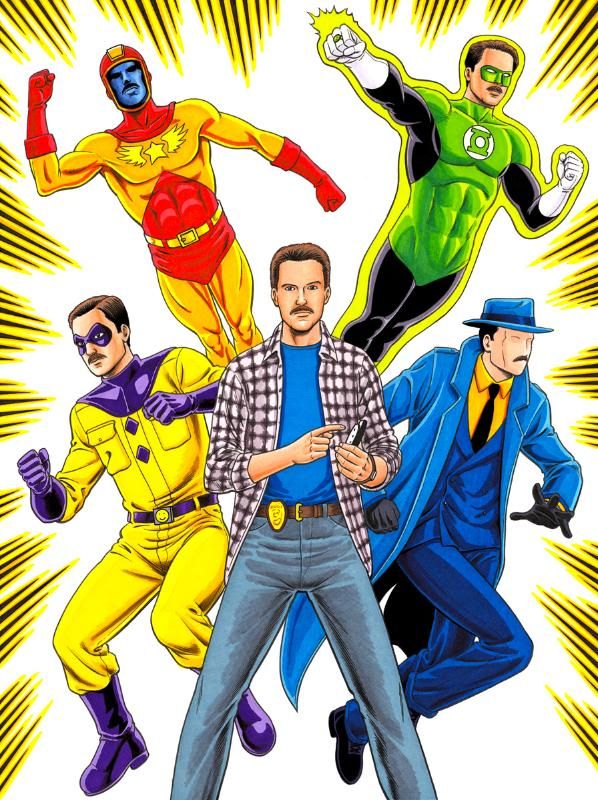|
|
Post by michaelpaciocco on Oct 23, 2010 19:27:24 GMT -8
Simple rule, pick a creator (not a character, not a run of a title) and give us one arc/trade collection/GN* that is the peak of that creator's prowess and state your case as to why.
*So, no, you can't say "The entire Thor run by Walt Simonson" - pick one arc from that run.
For example
Creator: Kurt Busiek
Trade collection: Astro City Volume 2: CONFESSION
WHY?
Look, I'm tempted to go the cheap shot route and just say that if "The Nearness of You" doesn't do something for you, you should get an X-ray to check if you have heart. But....even if we didn't count that story as the absolute peak of Astro City and Busiek, the main story of Confession is still the peak of Astro City and Busiek.
At first, yeah, it's a Hero's Journey, complete with whiney small-town boy POV character.
Except that he's not really that special, merely lucky that he got to show off to the right people at the right time.
He's clever, but only after being shown how limited his experience really is.
His mentor is not only one of the noblest characters, but deeply flawed, conflicted, and in some respects, self-defeating. Not your typical wise old wizard.
There is a sacrifice with real weight, because it's not a part of a prophecy, because it's not going to be retconned by Geoff Johns or Joe Quesada. Something that could never have happened.
Of all of Busiek's projects, this is the one with the most personal weight because it's a simple, easy-to-understand and impossible to forget plot. It's not nostalgia-porn, it's not a love letter to some lost innocence. It's competently told, nuanced and complex story with themes of revenge, redemption, mystery, and identity.
And it's easily one of the best superhero stories told in the last 30 years.
|
|
|
|
Post by Anders on Oct 24, 2010 13:15:54 GMT -8
Good thread!
Creator: Garth Ennis
Trade collection: Preacher Book 8: All Hell's A-Coming
I haven't read Garth Ennis extensively, but from all I've seen he has real talent but either he is completely clueless about it or he just doesn't care. Most of what he writes is (to me, at least) puerile garbage that's at best good for a guilty chuckle.
But sometimes he hits that perfect note where the characters and story come together and create something truly beautiful. I don't know if he doesn't recognize it himself, if he doesn't care about it or if he just can't control when it happens or what it is, but it's a crime that he doesn't do it more often.
Preacher as a whole is clearly his best work - 303 and War Stories have some good bits, and I've heard his Hellblazer is good but I haven't read it - even though it's a bit... uneven. (When I read it I try to pretend he hasn't written anything else, so I can read the, well, less mature bits as accents on the solid core rather than what he normally writes.)
So why pick this particular volume?
Mainly, Tulip's... well, origin story, but there's also the bits about Cassidy's background and the chemically castrated bartender. He also gets his point about slaughterhouses across without the ridiculously over-the-top meat statue woman from Salvation. (Yes, the Frenchman is also ridiculously over-the-top, but for some reason that bothers me less.) Even the bits with Starr are well-written and quite entertaining.
|
|
|
|
Post by michaelpaciocco on Nov 2, 2010 13:58:03 GMT -8
Creator: Warren Ellis
Story Arc: "Change or Die" in Stormwatch 48-50.
WHY?
Absolutely EVERYTHING Warren Ellis has ever said or will ever say on the superhero genre is right in these three issues. Now, granted, there was almost a year of buildup to this arc, buuut I don't think it's absolutely essential to understand this story.
The moral, which is basically the moral of all of Ellis' superhero stories (and a good chunk of his non-superhero stuff - I can think of maybe 2-3 things tops that don't fall into this category) is basically "We can't have nice things because most people are too stupid, lazy, or just plain bastards." It's cynical, and bittersweet, because we know that for all intents and purposes, the High and his team are in the right and Stormwatch is in the wrong, and to watch it all fall apart shows the limits of idealism and striving for a perfect world.
|
|
|
|
Post by jarddavis on Nov 16, 2010 11:07:41 GMT -8
Chris Claremont - Dark Phoenix saga.
He didn't want to write it. And it's the best thing he ever wrote. For that matter X-Men #137 is still one of the all time greatest comics ever written. He ripped his own heart out to write that story and it shows.
|
|
|
|
Post by michaelpaciocco on Nov 16, 2010 13:47:51 GMT -8
Actually Jard, I'd like to hear you elaborate more on what makes the Dark Phoenix saga the absolute Claremontian peak. While I can understand it's importance to the X-franchise, and as the solidification of many of Claremont's stylistic tics, I'm not sure it's higher than "Days of Future Past" or "God Loves Man Kills". What do you think it is about the Dark Phoenix saga that sets it apart from those other two?
|
|
|
|
Post by jarddavis on Nov 21, 2010 22:33:12 GMT -8
It changed comics.
It changed comics period. Not just the X-Men. Not just Marvel. It changed the comic book industry forever.
#1.) It put the X-Men on the map. I'd started reading X-Men about a year or two before that. Beginning of the Proteus story. Liked the Byrne and Austin art (Which by the way, was their peak. Neither has ever been that good again, art wise. ) And I was slowly growing fond of Cyclops and Colossus who both had powers I particularly liked.
Then came, #134(?) "Wolverine Alone." And he guts four Hellfire club agents in two pages. And that was my wake-up call. Comics were only what, a quarter? $.35 at the time? I was a pretty prolific reader in m single digit years. And all of a sudden, I didn't care what was happening in Avengers, Fantastic Four, Defenders or The JLA any more.
#137 was the ultimate emotional roller coaster ride for comics at that time period. And Claremont didn't want to write it that way. He got overruled by Shooter. He ripped his own heart out to write a story he didn't want to write.
God Loves, Man Kills is a fantastic story. But it's an argument against racism, and to this day, didn't have the emotional impact that #137 had. This was before the direct market. Before the boom of the industry. Before the term "fanboy." Before "Comics Shops" (Except here in Colorado where we had Mile High up in Boulder. )
Most of us new generations of fans had never read Denny O'Neils' GL/GA. We didn't know who a Doom Patrol was. We were the new kids on the block. And DC's characters at that time were stupid. Superman was stupid. Batman was stupid. They were boy-scouts compared to the Marvel guys, who you could relate to.
So yeah, while one could argue that GLMK's might have had a greater effect in the long term based solely on the fact that X-Men 2 essentially ripped off most of the plot, the fact of the matter is, the end of the movie sets in motion Phoenix.
I however will tell you that nothing has ever, in my opinion, affected the comic industry the way the Dark Phoenix run did.
|
|
|
|
Post by michaelpaciocco on Nov 22, 2010 7:15:09 GMT -8
While I'm not sure I would go that far Jard, you've made an excellent case for the Dark Phoenix Saga. Thank you.
|
|
|
|
Post by jessebaker on Dec 2, 2010 0:06:31 GMT -8
For me, Claremont's peak was "The Fall of the Mutants"; it was the pay-off to storylines that were about 4-5 years in the making and ended with what could have been Claremont leaving the franchise in the hands of another writer with all sorts of possibilities as far as the X-Men being offered a chance to go anywhere in the world to continue their fight against evil.
Claremont never had another chance like that again in his run and moreso, his run was never the same. The X-Men spent the next three years on the road, in Australia and later scattered to the wind.
|
|
|
|
Post by michaelpaciocco on Jan 6, 2011 21:30:49 GMT -8
Creator: Mark Waid
Comic: Flash #0.
Done in One. Time Travel. Simple uplifting humanistic story. Mike Wieringo art. END OF ARGUEMENT.
|
|



